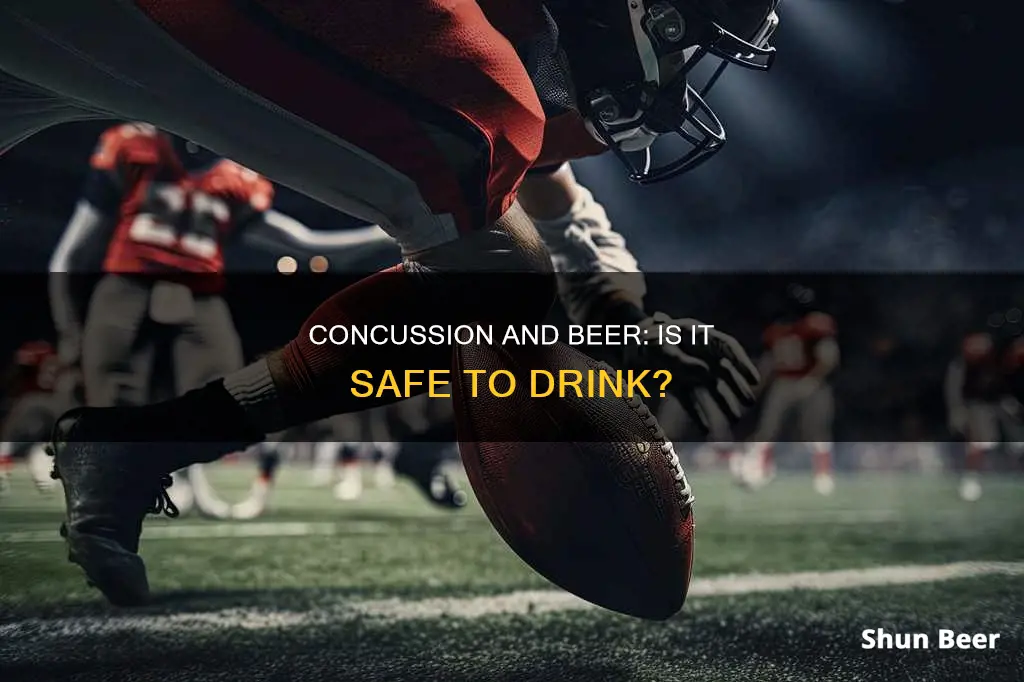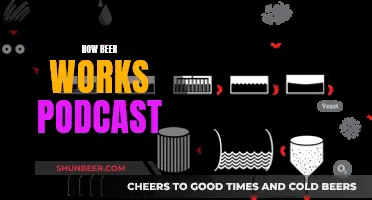
Drinking alcohol after a concussion is not recommended, as it can interfere with the healing process, worsen symptoms, and increase the risk of further injury. Alcohol is a neurotoxin, which means it can damage brain cells and negatively affect cognition and mental health. It can also impair balance and coordination, increasing the risk of falls and accidents. While there is limited research on the impact of alcohol on concussion recovery, healthcare professionals generally advise against drinking until fully recovered.
| Characteristics | Values |
|---|---|
| Recommended | No |
| Effect on brain | Disrupts normal functioning, impedes healing, exacerbates symptoms |
| Effect on recovery | Slows down or stops recovery, increases risk of further injury |
| Effect on cognition | Makes thinking problems worse, increases risk of emotional problems such as depression |
| Effect on seizures | Increases risk of having seizures |
| Effect on symptoms | Increases symptoms, makes them more severe and longer-lasting |
| Effect on balance and coordination | Impairs balance and coordination, increasing the risk of falls or accidents |
| Effect on medication | Can make anti-depressant medicines less effective, interacts with other medications |
What You'll Learn
- Drinking alcohol after a concussion can slow down recovery
- Alcohol is a neurotoxin that can damage brain cells
- Alcohol can increase the risk of seizures in people with a TBI
- Alcohol can cause or worsen depression in people with a TBI
- Alcohol can affect cognitive function, including memory and flexible thinking

Drinking alcohol after a concussion can slow down recovery
Alcohol and Concussion Recovery
After a concussion, it is generally advised to refrain from drinking alcohol until you are fully healed. Alcohol can slow down the recovery process and increase the risk of further injuries. Here are the reasons why drinking alcohol after a concussion is not recommended:
Impaired Healing and Increased Risk of Injuries
Alcohol can disrupt the normal functioning of the brain and impede the healing process. It can also worsen concussion symptoms such as headaches, dizziness, balance issues, cognitive difficulties, and sleep disturbances. Additionally, alcohol impairs balance and coordination, increasing the risk of falls or accidents that could lead to a second concussion or worsen the existing injury.
Cognitive Function and Mental Health
Alcohol consumption after a traumatic brain injury (TBI) can negatively impact cognitive skills like memory, flexible thinking, concentration, and problem-solving abilities. It may also worsen depressive symptoms or any pre-existing mental health issues. The negative cognitive effects of alcohol can last from days to weeks after drinking stops.
Seizure Risk
People with TBI are already at risk for seizures, and alcohol consumption may further increase this risk. Not drinking alcohol may help reduce the chances of experiencing seizures.
Medication Interactions
Drinking alcohol while taking prescription medications can be dangerous. Alcohol can interact with medications for anxiety, pain, depression, and other conditions, potentially leading to multiplied effects or overdose. It is crucial to consult with a healthcare professional if you are taking any medications.
Overall Recovery and Well-being
Alcohol consumption can affect your overall recovery and well-being. It can disrupt sleep quality, which is essential for full recovery. Additionally, alcohol can cause or worsen symptoms such as nausea, vomiting, loss of consciousness, memory loss, and confusion.
In summary, while there may be limited research on the specific effects of alcohol on concussion recovery, the potential risks outlined above highlight why it is generally recommended to abstain from alcohol until you are fully healed. Prioritizing your brain's healing process and overall health is crucial after experiencing a concussion.
Old Beer: Safe or Sickness Inducer?
You may want to see also

Alcohol is a neurotoxin that can damage brain cells
Alcohol is a neurotoxin, which means it can damage brain cells. It can cross the blood-brain barrier and directly affect neurons. While most alcohol is broken down in the liver, a healthy brain also has the ability to break down alcohol molecules locally. In a petri dish, a high enough concentration of alcohol will kill a neuron. However, the amount circulating in your blood after a few drinks is not enough to kill brain cells directly.
Alcohol disrupts communication between neurons in your brain and has been shown to alter hemodynamics (blood flow patterns across the brain), also known as neurovascular coupling (NVC). Intoxication is behind roughly half of all traumatic brain injuries. Alcohol releases endorphins, which make us feel good, but it also impairs our decision-making abilities.
Heavy or binge drinking can interfere with your brain's communication pathways and affect how your brain processes information. Binge drinking can lead to damage in the limbic system, increasing the risk of alcohol-related dementia and abnormalities in mood and cognitive abilities.
Alcohol-related brain damage alters both the structure and function of the brain. Increased alcohol intake is associated with damage to brain regions, including the frontal lobe, limbic system, and cerebellum, with widespread cerebral atrophy or brain shrinkage caused by neuron degeneration. This damage can be seen on neuroimaging scans.
The effects of alcohol on the brain are reversible if you stop drinking. Even brain atrophy can start to reverse after a few weeks of abstinence. However, it's important to note that alcohol does not need to kill brain cells to have negative effects on the brain.
UK Minors and Non-Alcoholic Beer: Is It Legal?
You may want to see also

Alcohol can increase the risk of seizures in people with a TBI
Drinking alcohol after a concussion is not recommended, as it can negatively impact the healing process and worsen symptoms. Alcohol is a neurotoxin, which means it can damage brain cells and alter brain chemistry. After a concussion, your tolerance for alcohol may be reduced, and you may experience increased sensitivity to its effects.
People with traumatic brain injuries (TBIs) are at risk for seizures, and consuming alcohol may further increase this risk. Alcohol use after a TBI can trigger seizures and make them more likely to occur. Not only does alcohol increase the chances of seizures, but it can also lead to worse outcomes in the long term.
The Model Systems Knowledge Translation Center (MSKTC), a resource for patients and caregivers, strongly advises against drinking alcohol while recovering from a concussion or TBI. They emphasize that alcohol can slow down recovery, increase the risk of another injury, and impair cognitive functions such as memory, concentration, and problem-solving.
The MSKTC also highlights the connection between alcohol and seizures in individuals with TBIs. They suggest that not drinking alcohol may help reduce the risk of seizures, which can have long-term consequences on visual memory, attention, problem-solving abilities, and perception.
It is essential to prioritize the healing process and avoid alcohol until you have fully recovered from a concussion. Seeking medical advice and following the recommendations of healthcare professionals is crucial to ensure a safe and complete recovery.
Morphine and Beer: A Dangerous Mix?
You may want to see also

Alcohol can cause or worsen depression in people with a TBI
Alcohol is a neurotoxin and a depressant, which means it can damage brain cells and negatively affect mood. After a TBI, the brain is more sensitive to alcohol, and even one or two drinks may not be safe. Alcohol can slow down or stop brain injury recovery and impair cognitive function, including memory and thinking flexibility. It can also increase the risk of seizures and make it more difficult to make decisions, affecting judgement and coordination and increasing the risk of further injury.
Additionally, alcohol can interfere with the effectiveness of anti-depressant medications. It is not recommended to mix alcohol with medication as it can suppress their effects and increase negative side effects.
Depression is about eight times more common in the first year after a TBI than in the general population. Given the negative effects of alcohol on brain function and mental health, consuming alcohol after a TBI can increase the risk and severity of depression.
It is important to note that the decision to consume alcohol after a TBI is ultimately an individual one and should be made in consultation with a doctor. However, it is generally recommended to abstain from alcohol or consume it in moderation to avoid negative consequences and promote healing.
The Beer Droid: Brewing Process Decoded
You may want to see also

Alcohol can affect cognitive function, including memory and flexible thinking
Drinking alcohol after a concussion is not recommended. Alcohol is a neurotoxin, which means it can damage brain cells. It can also affect the brain's chemistry, making us feel relaxed or happy, but it can also make us feel sad.
Alcohol can negatively impact cognitive function, including memory and flexible thinking. After a concussion, the brain is vulnerable and attempting to heal from the trauma it has experienced. Alcohol can disrupt the healing process and make symptoms worse. It can also increase the risk of further injuries, as it impairs balance and coordination.
The symptoms of post-concussion syndrome, such as impaired memory, decreased attention span, and slowed reaction times, can be intensified by drinking alcohol. Alcohol consumption can also increase the risk of seizures and trigger them.
Additionally, alcohol may affect people with a traumatic brain injury (TBI) more than it did before their injury. The negative cognitive effects of alcohol can last from days to weeks after drinking stops. Not drinking alcohol can help keep cognitive abilities sharp and focused.
Cool Hand Luke: Beer or Not?
You may want to see also
Frequently asked questions
It is not recommended to drink alcohol after a concussion. Alcohol can interfere with the healing process, worsen symptoms, and increase the risk of further injury.
Drinking alcohol after a concussion can lead to delayed healing, increased symptoms, and a higher risk of further injury. It can also impair cognitive function and make it more difficult to assess recovery progress and determine when it is safe to return to normal activities.
It is recommended to wait until all symptoms of the concussion have disappeared and you have been cleared by a medical professional. This can take anywhere from a few days to weeks or even months, depending on the severity of the injury.







